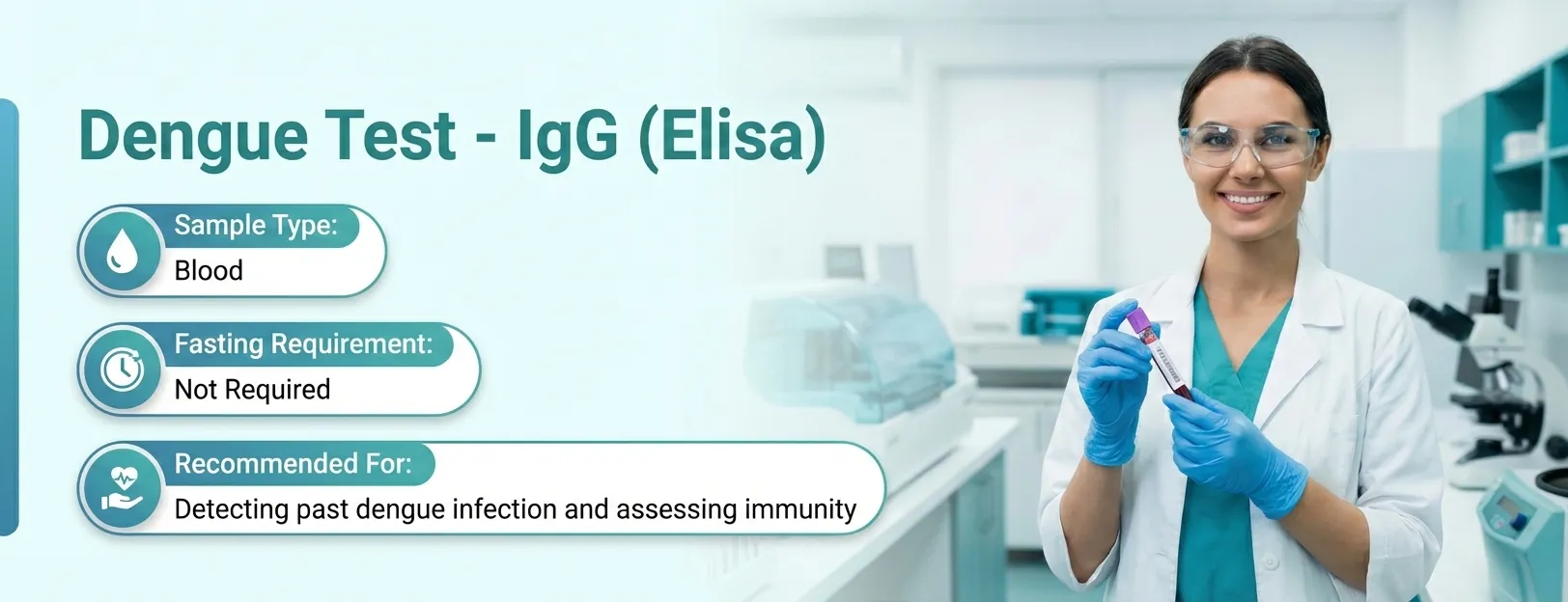86+ orders placed in your location
100% NABL & ISO Certified Lab • 100% Accurate Reports
Dengue Test - IgG (Elisa)
Anti Dengue Virus IgG Test, Dengue Virus IgG, IgG Antibody Test, Dengue Virus Antibody
- SummaryThe Dengue IgG ELISA Test detects IgG antibodies specific to the Dengue virus, indicating past infection or long-term immune response. It is commonly recommended for individuals with a history of dengue-like illness or in endemic areas to assess prior exposure. The test uses a blood sample, does not require fasting, and is suitable for all age groups as advised by a healthcare provider.Read more
- Reports Within16 HrsView Sample Report100% NABL & ISO Certified Labs
- SampleBlood
- AgeAll Age Group
- GenderMale and Female
- FastingNot Required
PharmEasy Promises
Know More About The Test
A quick info on Dengue Test - IgG (Elisa)
Overview
The Dengue IgG Test is used to diagnose a past infection of dengue. Dengue fever is a disease caused by mosquito bites. If one infected mosquito bites an individual, they can get the disease. Dengue fever does not transmit from one individual to another directly via air. Only when a mosquito bites an infected individual first and then bites a healthy individual, the healthy individual may develop dengue.
The dengue virus is usually widespread in hot and humid climates across the world. Outbreaks are considered more common during the monsoon. The incubation time for dengue infection ranges from 3 to 7 days. Although some forms of the disease are asymptomatic, the majority of people develop typical dengue fever.
Symptomatic patients will have mild symptoms like:
- Muscular pain
- Vomiting
- High-grade fever
- Headache
- Joint & muscular discomfort
- Rashes
These mild signs are most commonly seen in youngsters. But, on the other hand, children and young adults are at a higher risk of developing dengue haemorrhagic fever and dengue shock syndrome. This is because children and young adults are outside for long hours either playing or working and hence are more prone to mosquito bites.
Dengue haemorrhagic fever is dengue that produces bleeding from the nose, gums, and beneath the skin. Dengue fever can potentially progress to dengue shock syndrome, which results in severe bleeding and shock. Dengue fever can be fatal in some cases.
There is no particular therapy for this mild condition. Dengue fever usually passes in two weeks for the majority of patients. Till symptoms persist, you need to stay hydrated, get adequate rest, and use non-aspirin fever-reducing medicines for your body ache and fever. The most severe types of dengue typically necessitate a trip to the hospital for administering IV fluids.
To reduce the chances of contracting dengue fever when going to places where the disease is prevalent:
- Use DEET-based insect repellent
- Cover your arms, legs and feet with clothing
- Close any windows and doors that aren't screened
- As much as possible, rest
- Stay hydrated by drinking enough water and fluids
- Care for a sick newborn, kid or family member at home if the symptoms are moderate
Symptoms of a severe case of dengue
The warning signs generally appear 24–48 hours after the fever has subsided.
- Tenderness and discomfort in the abdomen
- Bleeding from the nose or gums is a common occurrence
- Blood in the vomit or the stools
- Being restless, exhausted or irritable
If you develop a fever or have symptoms of dengue fever, see a doctor. The doctor will prescribe a Dengue IgG Test.
Dengue Virus Antibodies IgG levels appear between 5 to 7 days after initial infection. Sometimes, even sooner in secondary infections. During the third week of primary infection, the IgG titers are the highest. From day 7 of fever through the next two weeks, IgG titers in secondary dengue infections grow to extraordinarily high levels (far higher than original infections). Thus, anti-Dengue IgG antibodies might last for months or even years.
If you see any warning symptoms, consult a doctor or go to the emergency room right away. A severe case of dengue fever is a medical emergency. It necessitates urgent medical attention in a clinic or hospital.
Other names of the Dengue IgG test
- Dengue Virus IgG Test
- Dengue Virus IgG Antibody Test
- IgG Antibody Test
- Anti Dengue Virus IgG Test
What does the Dengue IgG detect/measure and who is this prescribed for?
The Dengue IgG test is most commonly used to diagnose a past infection of dengue. They look for IgG antibodies generated by the body in response to a dengue fever infection. Because the body's immune system creates variable amounts of antibodies during a disease, a diagnosis may need a combination of these tests. IgM antibodies will be generated first and testing for IgG should be done at least 7-10 days after exposure.
Doctors prescribe the Dengue IgG test for individuals who have the symptoms of dengue, as mentioned above. Positive IgG tests for dengue antibodies found in an initial blood sample indicate that the individual was exposed to the dengue virus during the last few weeks.
The Dengue IgG test is prescribed for the following:
- Individuals who have been exposed to the dengue virus
- Individuals who have had a past dengue infection
- Individuals who currently have symptoms similar to dengue
Sample Type
The results of the Dengue IgG are related to the analysis of the blood samples. Therefore, it will be a simple five-minute test.
Test Preparation
The Dengue IgG test is a blood test. It will not require any specific preparation. Try avoiding any steroids or medicinal intake before giving away the blood samples.
Test inclusions: What parameters are included?
The Dengue IgG test includes testing of the IgG antibodies that are produced 7-10 days after the onset of fever.
How frequently should you take this test?
The Dengue IgG test is advised only once after a recent dengue infection. This test is done to confirm that you have had a past illness of dengue. You need not repeat this test again until you are infected with another variant of the dengue virus in the future. The Dengue IgG test only indicates past infection and hence cannot be repeated during an active infection.
Risk Assessment
Diagnosis of past Dengue virus infection
Ranges
The Dengue Fever Virus IgG antibody test ranges are:
Range | Result | Remarks |
1.64 IV or Less | Negative | Absence of significant level of Detectable Dengue Virus IgG antibody |
1.65-2.84 IV | Equivocal | Questionable presence of antibodies. Repeat testing. |
2.85 IV or Above | Positive | Dengue Fever Virus IgG antibody is detected. Current or Past Infection. |
Test Result Interpretation
The Dengue IgG antibodies are indicative of a past infection of the dengue virus. IgG antibodies take a longer time to develop after the infection has passed. They stay on for a longer time in your body, in some cases, for life.
Dengue IgG negative test results mean that you may or may not have been exposed to the dengue virus in the past. It could also mean that your antibody levels are very low and could not be detected in the test. Dengue IgG positive test results mean that you have been exposed to the dengue virus in the past.
Was This Test Information Helpful?
Please rate your experience
References
People Also Ask
How long is dengue IgG positive?
What does dengue IgG positive mean?
What is the difference between dengue IgG and IgM?
What does it mean to test IgG positive?
Have any doubts? Ask us.
Ask us anything about the Dengue Test - IgG (Elisa) to understand it better
We provide trusted, expert-curated health content to support better awareness,prevention, and care.
Backed by experienced doctors, medical experts, and strict editorial standards.


